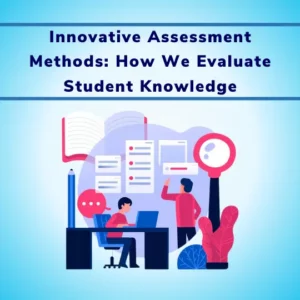Article Contents
Introduction
In the traditional educational environment, assessments often revolved around pen-and-paper exams, focusing heavily on a student’s ability to memorize and recall information.
While this method has its place, it falls short of evaluating a student’s practical abilities, problem-solving skills, and capacity to apply knowledge in real-world scenarios.
As the global job market evolves, so too must our methods of education and assessment. Enter the dynamic duo of case study-based assessment and generative AI.
According to the Future of Jobs Report by the World Economic Forum, 94% of business leaders expect employees to pick up new skills on the job, a significant increase from 65% in 2018. This reflects the changing landscape of employment, where the ability to adapt and solve problems is more critical than ever.
The education sector has a chance to improvise the examination process to adapt to the changing needs of the corporate employment world.
The Shift to Practicality and Problem-Solving
The essence of education is to prepare students not just academically but also for the challenges and opportunities of the real world.
This preparation requires a shift from traditional memorization-based assessments to more practical, problem-solving-oriented methods.
Case study-based assessment embodies this shift, presenting students with real-world scenarios and problems that demand not just theoretical knowledge but critical thinking and practical solutions.
A study by the OECD on education outcomes showed that students engaged in problem-based learning improved their critical thinking and problem-solving skills by up to 20% more than those in traditional learning settings.
How Does Case Study-Based Assessment Work?
At its core, this approach involves presenting students with a specific case study or problem that mirrors situations they might encounter in the real world. These case studies are designed to be complex, requiring a deep understanding of the subject matter, the ability to think critically, and the creativity to devise effective solutions.
The role of Generative AI in this process is both innovative and invaluable. It can analyze a student’s response to the initial case study, generate relevant follow-up questions, and guide the student through a deeper exploration of the problem.
This interactive process ensures a comprehensive assessment of the student’s problem-solving ability, practical knowledge, and depth of understanding.
According to a report by LinkedIn, 92% of talent professionals and hiring managers agree that candidates with strong soft skills, including problem-solving and critical thinking, are increasingly important, indicating a shift in what attributes are most valued in the workforce.

Use Cases of Case Study-Based Assessment
The integration of case study-based approaches with generative AI has opened up a plethora of opportunities for conducting varied and intricate assessments.
This methodology allows educators and institutions to simulate real-world scenarios that students are likely to encounter in their professional lives, thereby evaluating their practical skills, problem-solving abilities, and adaptability. Below are some expanded examples of case study-based tests that can be conducted by educational institutes to prepare students for the complexities of the real world:
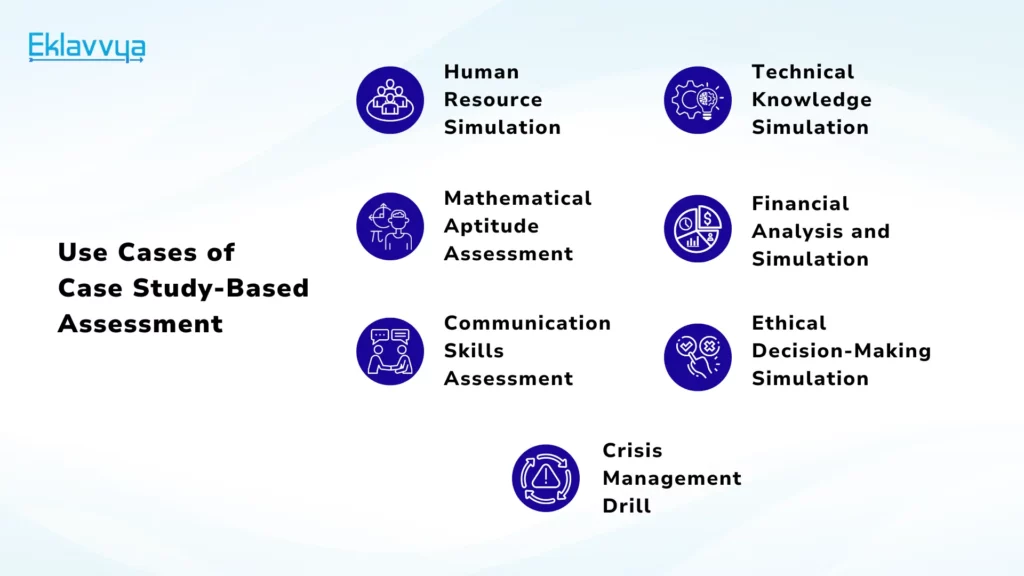
Human Resource Simulation
This type of assessment immerses candidates in a realistic organizational scenario, where they must navigate the complexities of human resource management, such as conflict resolution, team building, or strategic decision-making.
The Generative AI acts as an interactive evaluator, analyzing the candidate’s responses to the situation presented in the case study and generating follow-up questions to delve deeper into their reasoning and decision-making process. Such simulations are invaluable in management courses, offering students a hands-on experience of HR dynamics.
Technical Knowledge Simulation
Tailored to assess the depth of a student’s understanding in a specific field, these case studies present technical problems or projects that reflect real-world challenges. Whether it’s engineering, computer science, healthcare, or any other domain, students are tasked with applying their knowledge to devise viable solutions.
The Generative AI evaluates the student’s response, offering insights and feedback on their practical understanding and application of technical principles. This approach not only tests theoretical knowledge but also hones problem-solving skills crucial for their future careers.
Mathematical Aptitude Assessment
Mathematical aptitude is a critical skill across various disciplines, not just in fields directly related to mathematics but also in business, economics, engineering, and the sciences. Incorporating mathematical number crunching into case study-based assessments can provide a comprehensive evaluation of a student’s analytical skills, problem-solving abilities, and practical application of mathematical concepts.
Financial Analysis and Simulation
Scenario Description: Students are provided with a comprehensive case study of a fictional company facing financial challenges, such as declining profits, increasing debt, or a need for investment in new technology. The case study includes detailed financial statements, market analysis, and competitor information.
Task: Students are required to conduct a thorough financial analysis of the company, utilizing mathematical concepts and techniques. This may involve calculating key financial ratios (like liquidity ratios, profitability ratios, and leverage ratios), forecasting future revenues based on given data trends, and evaluating investment options using net present value (NPV) or internal rate of return (IRR) calculations.
Generative AI’s Role: Once the student submits their analysis, the Generative AI evaluates the accuracy of their calculations, the soundness of their financial reasoning, and the viability of their proposed solutions. The AI can further challenge the student by introducing new variables or unexpected market changes, asking for recalculations or adjustments to their initial analysis. This dynamic interaction encourages students to think on their feet and apply mathematical concepts to solve complex, evolving problems.
Communication Skills Assessment
Effective communication is a cornerstone of success in any career. Using generative AI, educators can create scenarios requiring students to draft emails and reports or engage in simulated dialogues with customers, team members, or vendors.
These case studies evaluate a student’s ability to convey information, professionally, and persuasively, offering feedback on areas for improvement. Such assessments are critical in refining the communication skills necessary for navigating the corporate world.
Ethical Decision-Making Simulation
Ethics play a crucial role in professional life. A case study-based assessment can immerse students in scenarios where they face ethical dilemmas, requiring them to balance competing interests and make decisions that reflect moral principles. This type of assessment can be particularly beneficial in fields like business, law, and medicine, where ethical considerations are paramount.
Crisis Management Drill
This assessment immerses students in high-pressure situations, such as a company facing a PR crisis, a natural disaster response, or a cybersecurity attack. Students must quickly analyze the situation, develop a response strategy, and communicate it effectively. This tests their ability to remain calm under pressure, think critically, and lead through crises.
Benefits of Case Study-Based Assessment with Generative AI
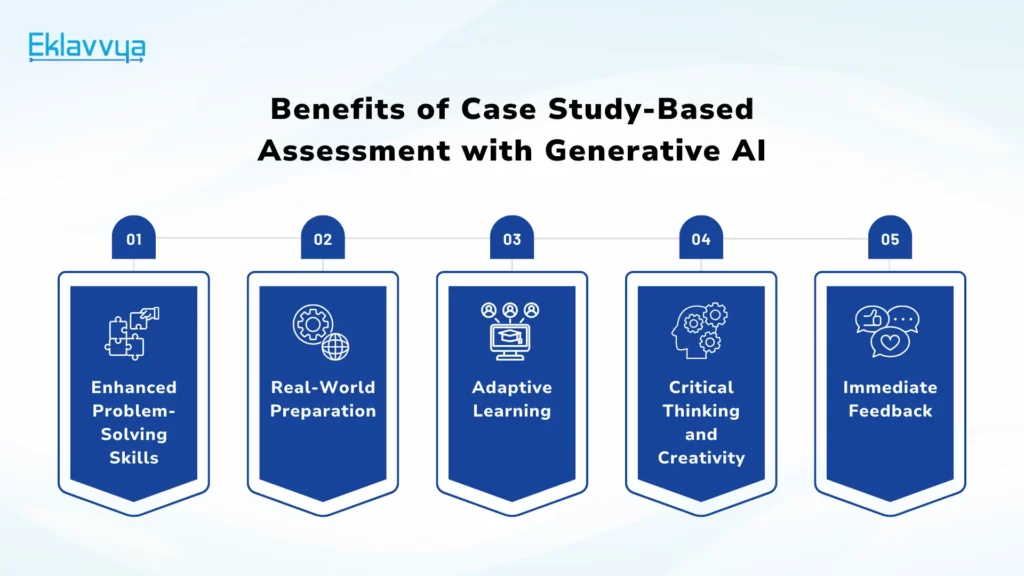
- Enhanced Problem-Solving Skills: This method pushes students to apply their knowledge in practical scenarios, enhancing their ability to solve problems creatively and effectively.
- Real-World Preparedness: By dealing with real-world cases, students gain insights into practical challenges and opportunities, preparing them for future careers in a way traditional exams cannot.
- Adaptive Learning: Generative AI enables personalized feedback and adaptive questioning, ensuring that students are challenged at their level of understanding and beyond.
- Critical Thinking and Creativity: Students are encouraged to think critically about the problems presented and to approach solutions creatively, skills highly valued in any career.
- Immediate Feedback: AI-driven assessments can provide immediate feedback, allowing students to understand their areas of strength and where they need improvement without delay.
Research indicates that students using adaptive learning technologies, which adjust to the learner’s level of understanding, can experience a 25% increase in learning outcomes compared to traditional methods. This showcases the effectiveness of personalized learning paths enabled by AI.
Implementing Case Study-Based Assessment in Education
The implementation of this assessment method requires careful planning and consideration. Educators must design case studies that are relevant, challenging, and reflective of real-world scenarios.
Additionally, the integration of Generative AI necessitates technical resources and training for both educators and students to ensure the technology is used effectively and ethically.

The Future of Education
The introduction of case study-based assessment with Generative AI marks a significant step forward in educational assessment. It aligns with the needs of a modern workforce, emphasizing the importance of practical knowledge, problem-solving skills, and the ability to adapt to new challenges.
As this approach gains traction, it has the potential to transform not just how we assess learning but how we value and understand knowledge itself.
In conclusion, a combination of case study-based assessment and Generative AI offers a promising new direction for educational assessment.
By focusing on practical abilities and real-world applicability, this method prepares students not just to succeed academically but to thrive in their future careers. As we continue to explore and refine this approach, the possibilities for enhancing education and student outcomes are boundless
The Eklavvya platform combines an integrated assessment approach with generative AI and case studies. This allows you to easily create case study-oriented assessments for any topic or subject, tailored to your educational needs. Students can engage with these case studies by interacting directly with a chatbot while solving them.
The AI chatbot evaluates the candidate’s problem-solving ability, ensuring an accurate and interactive overall skill assessment. If you’re intrigued by this unique case study-based evaluation process, consider visiting Eklavvya to explore the benefits it can offer you.
Generative AI analyzes the student’s responses to generate contextually relevant questions, challenging the student to explore the case study further and demonstrate a deeper understanding.
Yes, with careful design, case study-based assessments can be tailored to fit any subject, providing a versatile tool for evaluating student learning across disciplines.
While AI offers tremendous benefits, there’s always a risk of bias in its programming. It’s crucial to continually monitor and update AI systems to ensure fairness and accuracy in assessments.


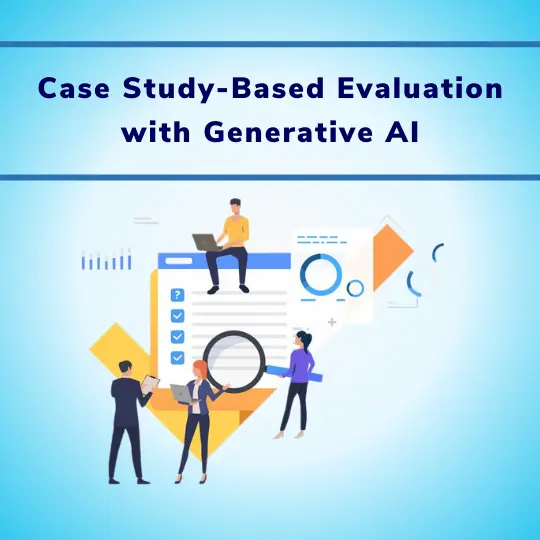
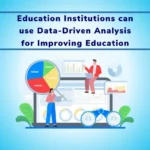
![How Government-Led Exams at 250+ Locations Are Setting New Standards of Integrity [Case Study]](https://www.eklavvya.com/blog/wp-content/uploads/2024/04/Enhancing-Exam-Integrity-Government-Certification-in-250-Locations-150x150.webp)
![Transforming Central Govt. Exams Evaluation: How Onscreen Marking is Leading the Charge [Case Study]](https://www.eklavvya.com/blog/wp-content/uploads/2024/04/How-Onscreen-Marking-Revolutionized-Central-Govt-Exams-Case-Study-1-150x150.webp)
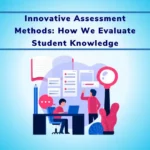
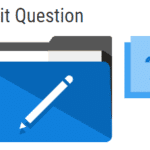

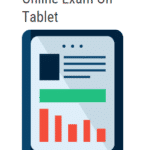









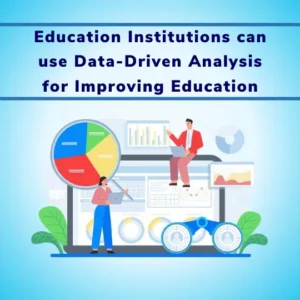
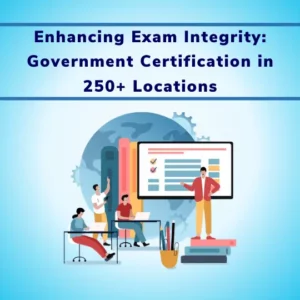
![How Onscreen Marking Revolutionized Central Govt Exams [Case Study]](https://www.eklavvya.com/blog/wp-content/uploads/2024/04/How-Onscreen-Marking-Revolutionized-Central-Govt-Exams-Case-Study-1-300x300.webp)
